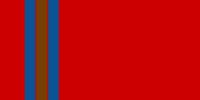Human rights in Rakeo
| Part of a series on |
| Human rights in Rakeo |
|---|
| 200px |
|
Outline |
Rakeo is an openly totalitarian state which heavily restricts human rights, historically engaging in arbitrary arrests, indefinite detention, and deportations. Numerous groups within Rakeo exert extrajudicial powers over citizenry which is either ignored or condoned by the government. In addition to not observing the authority of the TCN, Rakeo has no outstanding human rights agreements with any foreign government, making travel ill-advised.
Contents
Freedom of speech
Citizens' freedom of speech is heavily limited. Rakeo has no non-governmental radio and television stations, and no internet services beyond Olino Hotel. According to the current tourist code of the country, only citizens registered with cultural or economic institutions (which are state run), may interact with or be interacted with by tourists.
Freedom of press
The only foreign press allowed in Rakeo is translated segments from the Creeperian Canal Cuatro, Canal Seis, and Canal Siete. Radio signals from Sequoyah and Creeperopolis is regionally available, but legally prohibited.
Freedom of movement
Unauthorized emigration from Rakeo is illegal. While no nation has official extradition processes to Rakeo, state security services have allegedly kidnapped defectors.
Deportations
Kidnappings
International
Domestic
The national and city police forces have allegedly kidnapped their enemies, sometimes demanding ransoms as bail, or leaving victims stranded in remote or hostile terrain.
Freedom of affiliation
Black marking
Security agencies have allegedly marked houses with a black streak to indicate displeasure with household members activity, which is sometimes followed by the disappearance of the person(s) in said household.
Labor crackdowns
Unionization, strikes, sit-ins, and all other forms of labor organization were declared illegal and subversive activities by the Second Republic of Rakeo, and the practice has continue under the Stratocratic regime.
Religious persecution
Rakeo does not permit foreign priests of any religion enter the country, and carrying religious material into the country is heavily discouraged. While the country is not state-atheist, it's historical struggles in balancing power between religious and secular authorities have lead to greatly diminished religious freedoms. In addition, the Catholic Church and its members police religion within areas of majority control. This puts adherents of Protestantism or Islam at increased risk of violence.
Political prisons
Rakeo maintains that it does not detain critics, but satellite images of the country suggest that at least five labor camps are active in the country. The camps are estimated to contain between 35,000 to 60,0000 prisoners.
